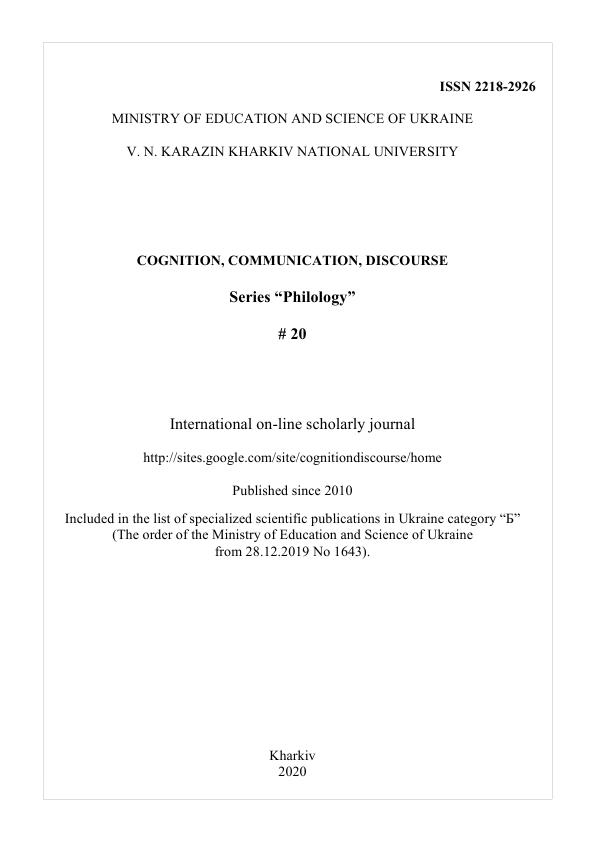Linguistic Means of Authorization in Modern English Magazine Discourse: Constructionist Rhetorical Approach
Abstract
The article discusses the linguistic means of authorization in English magazine discourse. It proposes a definition of authorization and its discursive realization with the implementation of rhetorical canons and ways of persuasion. The linguistic means of authorization is represented by constructions which due to the fusion of form and meaning or form and function reflect the authorship – individual, institutional or collective. The paper distinguishes two types of constructions: deictic indicating individual authorization and impersonal pointing to the institutional authorship. With respect to the referential meaning of its constituents, deictic constructions fall into orientational fixing the author’s place in the environment: somatic relating to the author’s body; perceptual rendering visual, auditory or tactile modalities; locational referring to the author’s whereabouts. Constructions denoting an author’s activity refer to different spheres: cognitive; communicative; professional. Constructions referring to social relations reveal the addressor’s roles in two domains: immediate surroundings, covering family, friends, household as well as the wide public life encompassing politics and economics. Constructions appealing to pathos evoke evaluation, emotions or human needs uniting the author and readers. Constructions rendering institutional authorization represent the authors’ distance from the contents by four subtypes of subjective constructions: nominal, pronominal, predicative referring to event participants as well as discursive. Moreover, the functioning of deictic and impersonal constructions as authorization devices is subordinated to disposition with differing frequency. The collective authorship, which can be bi- and multiple, results from the interaction of constructions rendering individual and institutional authorization.
Downloads
References
Aristotle. (1991). On Rhetoric: A Theory of Civic Discourse. Oxford: Oxford University Press.
Aristotle. (2010). Rhetoric. New York: Cosimoclassics.
Barthes, R. (1993). The death of the author. In D. Graddol, & O. Boyd-Barrett (Eds.). Media texts, authors and readers: a reader (pp. 166-171). Clevedon, England; Philadelphia: Multilingual matters Ltd, The Open University.
Bohnenkamp, A. (2002). Autorschaft und Textgenese. In H. Detering (Ed.). Autorschaft. Positionen und Revisionen (pp. 62-79). Stuttgart: Metzler.
Burke, M. (2014). Rhetoric and poetics: the classical heritage of stylistics. In M. Burke (Ed.). The Routledge handbook of stylistics (pp. 11-31). New York: Routledge.
Burke, M. (2016). Discourse implicature, Quintilian and the Lucidity Principle:
rhetorical phenomena in pragmatics. Topics in Linguistics, 17(1), 1-16. DOI: https://doi.org/10.1515/topling-2016-0001
Dijk, T. A. van. (1985b). Structures of news in the press. In T. A. van Dijk (Ed.). Discourse and Communication (pp. 69-93). Berlin: De Gruyter.
Dijk, van T. A. (1986). News schemata. In T. A. van Dijk (Ed.). Studying Writing. Linguistic Approaches (pp. 155-186). Beverly Hills: Sage.
Dijk, van T. A. (1991). The interdisciplinary study of news as discourse. In T. A. van Dijk (Ed.). Handbook of Qualitative Methods in Mass Communication (pp. 108-120). London: Routledge.
Enos, R. L. (2006). Arrangement. In Th. O. Sloane (Ed.). Encyclopedia of rhetoric (pp. 49-53). Oxford: Oxford University Press.
Enos, T. (2011). Encyclopedia of rhetoric and composition: communication from ancient times to the information age. New York: Routledge.
Fairclough, N. (1995). Media Discourse. London: Arnold Publishers.
Goldberg, A. E. (2003). Constructions: a new theoretical approach to language. TRENDS in cognitive sciences, 7(5), 219-224.
Goldberg, A. (2006). Constructions at Work: The Nature of Generalization in Language. Oxford: Oxford University Press.
Haynes, C. (2005). Reassessing "genius" in studies of authorship. Book History, 8, 287-320.
Leith, S. (2012). You Talkin’ to me? Rhetoric from Aristotle to Obama. London: Profile Books.
Maslow, A. H. (1970). Motivation and Personality. New York: Harper & Row Publishers.
Minnis, A. J. (1993). The Medieval concept of the author. In D. Graddol, & O. Boyd-Barrett (Eds.). Media texts, authors and readers: a reader (pp. 161-166). Clevedon, England; Philadelphia: Multilingual matters Ltd, The Open University.
Potapenko, S. I. (2017). Constructions in English: from paradigmatic to syntagmatic relations. Literatura ta kultura Polissia. Seriia: Filolohichni nauky, 89, 172-180.
Renkema, J. (2004). Introduction to Discourse Studies. Amsterdam: Benjamins.
Schönert, J. (2009). Author. In P. Hühn, J. Pier, W. Schmid, & J. Schönert (Ed.). Handbook of Narratology (pp. 1-13). Berlin, New York: Walter de Gruyter.
Selbmann, R. (1994). Dichterberuf: zum Selbstverständnis des Schriftstellers von der Aufklärung bis zur Gegenwart. Darmstadt: Wiss. Buchges.
Scholz, B. F. (1999). Al ciato alsemble matum pater et princeps. Zur Rekonstruktion des früh modernen Autorbegriffs. In F. Jannidis (Ed.). Rückkehr des Autors. Zur Erneuerung eines umstrittenen Begriffs (pp. 321-351). Tübingen: Niemeyer.
Tomasello, M. (2000). First steps toward a usage-based theory of language acquisition. Cognitive Linguistics, 11(1/2), 61-82.
Vorozhbitova, A. A. (2010). Lingual rhetoric paradigm as integrative research prism in philological science. European Researcher, 2(1), 183-190.
Woodmansee, M. (1994). The construction of authorship: textual appropriation in law and literature. Durham and London: Duke University Press.
Copyright (c) 2020 Potapenko Serhiy Ivanovych, Andriishyna Kateryna Ivanivna

This work is licensed under a Creative Commons Attribution-NonCommercial-NoDerivatives 4.0 International License.
Authors, who publish with this journal, accept the following conditions:
The authors reserve the copyright of their work and transfer to the journal the right of the first publication of this work under the terms of the Creative Commons Attribution License (CC BY), which allows other persons to freely distribute a published work with mandatory reference to the authors of the original work and the first publication of the work in this journal.
Authors have the right to enter into separate additional agreements for the non-exclusive dissemination of the work in the form in which it was published by this journal (for example, to post the work in the electronic institutions' repository or to publish as part of a monograph), provided that the link to the first publication of the work in this journal is given.
The journal policy allows and encourages the authors to place the manuscripts on the Internet (for example, in the institutions' repositories or on personal websites), both before the presentation of this manuscript to the editorial board and during review procedure, as it contributes to the creation of productive scientific discussion and positively affects the efficiency and dynamics of citing the published work (see The Effect of Open Access).




